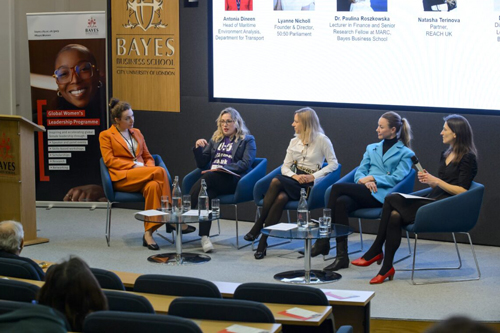Panel explores how women can climb ladder in 'male' industries
While many glass ceilings have been broken, women seeking and holding leadership roles in male-dominated industries face particular challenges
Four women leaders in male-dominated industries shared their experiences and insights at Bayes Business School last week.
The panel discussion, chaired by Dr Janina Steinmetz, who leads the Bayes Global Women‘s Leadership Programme, explored the particular challenges facing women in sectors such as transport, real estate and finance – and the campaign for a gender-balanced House of Commons.
Introducing the discussion, Janina said: “Globally we see more women in leadership positions and that makes a lot of sense because we now have a lot of research evidence that diversity in leadership positions actually benefits organisations.
“However, most of this progress has happened in industries that tend to be female-dominated. Even the few women who rise to leadership positions in male-dominated sectors, report problems such as imposter syndrome or even sexual harassment and other forms of discrimination due to gender stereotyping.”
Without women at the table, issues that particularly women will be sidelined, Lyanne Nicholl, chief executive of 50:50 Parliament, said – pointing to lessons of the covid pandemic.
“Representation shapes lives. The covid inquiry has revealed the macho atmosphere (in government) and how issues that largely affected women, such as domestic abuse and childcare, were largely sidelined. Even the health and safety equipment for health workers did not fit many women. While there has been progress in boosting the number of women in Parliament it is completely unacceptable that at the current rate of progress it will take 75-100 years to achieve parity.”
Lyanne said that while the charity sector is female dominated at lower levels and in senior leadership teams, that is not reflected at board level.
“Even as a director and as CEO I have been belittled and experienced sexual harassment. Once you get to a board level, you will encounter those same blocks and barriers. And it's not easy being a woman CEO in the charity sector, So unsurprisingly, in the women's democracy sector we work very collaboratively and it's a very different vibe from what I have had in other parts of the charity sector.”
Where leaders called John outnumber women
Natasha Terinova, a partner at venture capital firm REACH UK, which backs tech start-ups around the real estate market, noted that by combining venture capital and real estate she spans two male-dominated industries. She pointed out that the number of American public companies led by a man called John is higher than those led by women. Just 16 of the 1800-plus companies on the Tokyo Stock Exchange are run by a woman.
Picking up Janina’s comments on the business benefits of a diverse leadership, Natasha highlighted the work of a consultancy aimed at achieving gender parity in the financial sector.
“My friend runs a consultancy and she has a case study confirming that when a bank increased the number of female leaders, it saw a drastic improvement in its financial performance. That just makes sense as they are serving both male and female customers so it’s a case of know your client.”
Has anyone seen a woman here?
Dr. Paulina Roszkowska, who lectures in finance at Bayes, is also a Senior Research Fellow at the school’s respected Mergers & Acquisitions Research Centre. In the latter role she has identified “literally one woman in the world who is a partner for M&A in any consulting company, and that's KPMG”.
Recalling her years working as an investor relations manager in the world of finance, she worked solely with male CEOs, CFOs and CTOs. When entering an earnings call, she would be one of two or three women in a room of 30-50 investors.
As something of an introvert, Paulina shared that she had something that she called the 30 Seconds Rule, or 30 second window.
“As a blonde woman entering a room full of men I have literally 30 seconds to prove that that what I'm going to say is meaningful, because otherwise they're going to dismiss whatever I'm saying, if I haven’t proved that I'm worthy. If a man enters the room and starts talking, it doesn't really matter what he says. By default he is listened to.”
Economist Antonia Dineen, Head of Maritime Environment Analysis in the Department for Transport, has conducted economic assessments for the Road Investment Strategy, which guides investment of around £25 billion, and airport expansion. While the department has a “very good picture” in terms of appointing women to senior roles, Antonia said, that is not always replicated across the civil service.
The MPs and stakeholders she and colleagues work with tend to be more male dominated, which often means policy development tends to be with men as well. She said it's very important when you're developing policy that affects everyone in the UK for it to reflect everybody in the UK.
Several women commented on the challenge of putting themselves forward for promotion or career-enhancing projects without being seen as “pushy” or arrogant. Initiatives such as mentoring or networking are still vital to building women’s confidence, they said.
Paulina said: “It’s interesting to talk about confidence because that sort of suggests that if women can just be assertive then the rest will follow from this. But that kind of places the burden of change on women, suggesting men and the organisation don’t have to do anything.”
Paulina explained her own reservations about advising women to exude confidence in male-dominated settings – not least because people react differently to confident men and confident women. She observed with her postgraduate students similar behaviours to those she had seen in industry.
“When I was a junior lecturer teaching finance in graduate MBA programmes I sometimes found it difficult with the feedback from some students. My parents would suggest that I teach marketing instead because ‘everyone likes marketing’. But finance is my thing. That was the industry I had worked in. I think that the best advice that I received was just to do what you love, because that is where authenticity comes from. Doing what you love carries natural confidence and facilitates succeeding in what you do.”




